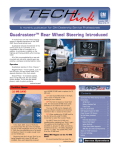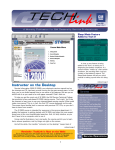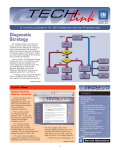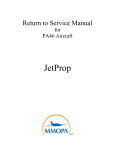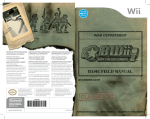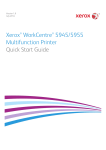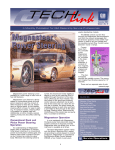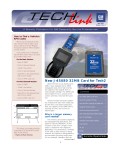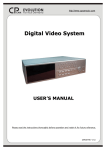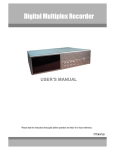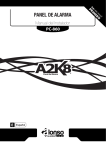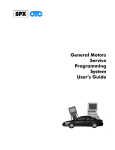Download OnStar Service Issues
Transcript
May 2001 Volume 3, No. 5 Techline News OnStar Service Issues SI 2000 Now Updated Weekly Beginning the first week in April, the SI 2000 website is being updated once a week. The latest information will be available each Friday morning. This is twice as often as before. To access the information, use your internet browser to go to website http://service.gm.com. Do not use “www” in this address. Click on Service Manuals, Bulletins and Campaigns. You will need to type your User Name and Password to go past this point. Next, on the SI 2000 Home Page, select the area you’re interested in. By the way, notice that you now have a choice of two languages: English and French. The information that is updated each week includes Service Manual, Bulletins, Campaigns, and Preliminary Information (PI) titles. By clicking on Latest News, you will see a list of Bulletins, Campaigns and PI titles that have been recently added. A box at the end of the page allows you to select 2, 4, 6 or 8 weeks. Service manual revisions and additions are not indexed. The internet will always be your freshest source of service information. The service information on GM ACCESS will continue to be updated on a two week cycle. And it’s even possible that new bulletins may appear on SI 2000 before the paper copies arrive in your dealership. – Thanks to Lisa Scott Most systems on GM vehicles are integrated completely into the vehicle. They carry out their intended functions without reacting to influences from outside the vehicle. A few systems, though, can be affected by the behavior of something outside the vehicle. For instance, the radio depends on receiving an acceptable signal from the radio station’s tower. Radio reception can be affected by external interference from overhead electrical wires, faulty ignition in nearby vehicles, and driving past tall buildings or through tunnels. Similarly, the proper operation of the OnStar system is affected both by invehicle components and by influences coming from outside the vehicle. The OnStar system has several independent elements that must work together in order for the system to function properly. The hardware in the vehicle . The Vehicle Interface Unit and Vehicle Communications Unit, the cellular anten na, the GPS antenna, and related cables must operate properly and must interface continued on page 2 1 Contents OnStar Service Issues . . . . . . . . . . . . . . . . . . . .1 SI 2000 Now Updated Weekly . . . . . . . . . . . . . .1 Dealership PC Network Strategies . . . . . . . . . . .4 Dinghy Towing -- A Reminder . . . . . . . . . . . . . . .5 Recognizing OE Batteries . . . . . . . . . . . . . . . . .5 New Mid-Size Truck Rear Suspension System . . . .6 Malibu Exhaust Rattle . . . . . . . . . . . . . . . . . . . .7 Armrest Lowers Itself During Braking . . . . . . . . .7 GM Service Clubs, Part 4 . . . . . . . . . . . . . . . . .7 TAC Tips . . . . . . . . . . . . . . . . . . . . . . . . . . . . .8 Bulletins . . . . . . . . . . . . . . . . . . . . . . . . . . . . .8 Service Operations correctly with the vehicle. GM TechLink is a monthly magazine for all GM retail technicians and service consultants providing timely information to help increase knowledge about GM products and improve the performance of the service department. This magazine is a companion to the GM Edge publication. Publisher & Editor: Mark Stesney GM Service Operations [email protected] Technical Editor: Jim Horner [email protected] 1-248-816-3641 Marie Meredith Desktop Publishing: Greg Szpaichler, MediaWurks [email protected] 1-248-649-5465 Write to: TechLink PO Box 500 Troy, MI 48007-0500 GM TechLink on the Web: http://service.gm.com General Motors service tips ar e intended for use by professional technicians, not a "do-it-yourselfer." They are written to inform those technicians of conditions that may occur on some vehicles, or to provide information that could assist in the proper service of a vehicle. Properly trained technicians have the equipment, tools, safety instructions and know-how to do a job properly and safely. If a condition is described, do not assume that the bulletin applies to your vehicle or that your vehicle will have that condition. See a General Motors dealer servicing your brand of General Motors vehicle for information on whether your vehicle may benefit from the information. Inclusion in this publication is not necessarily an endorsement of the individual or the company. Copyright© 2001 General Motors Corporation All rights reserved. The OnStar Call Center Application. This application must be able to send and receive information from the vehicle. Signals from US GPS satellites. The OnStar equipment in the vehicle must also be able to receive and interpret signals from the US Global Positioning Satellites orbiting above the earth. The Cellular Phone System Issues There are numerous issues that arise from utilizing a cellular system supplied by an independent third party. Cellular towers can be busy, depending on the level of traffic on the system. Some areas of the country may have a limited or inadequate number of cellular towers to handle the load of cellular phone calls. The OnStar system relies upon all of these independent systems to work together to provide service to OnStar subscribers. It is precisely this interaction that makes the OnStar system unique. But this interaction of internal and external factors can complicate the proper diagnosis of customer concerns. Production Manager: FAX number: The cellular phone network. The cellular network must be able to deliver a two-way cellular call. The diagnosis of the in-vehicle hardware is not significantly different from diagnosing other on-vehicle modules. The real difficulty in diagnosing the OnStar system lies in assessing whether the customer’s concern is the result of a problem in the vehicle hardware or an issue with the other external systems necessary for OnStar operation. On-Vehicle Equipment Issues Many on-vehicle equipment issues can be resolved by simply ensuring that the system components are installed or connected properly. The cellular antenna mast must be installed on the vehicle and the coax cable must be tightly connected to the Vehicle Communication Unit (VCU) and the antenna base. Vehicle Communication Unit (VCU) and the Vehicle Interface Unit (VIU) The GPS antenna must have a good connection both at the antenna and at the Vehicle Interface Unit (VIU). The GPS antenna coax is rather fragile cable. When inspecting or replacing the cable, do not bend it to a curve less than 2 inches in diameter or the cable will be damaged. Cellular Phone System OnStar has made an arrangement with Verizon to provide cellular service for the OnStar system. To provide OnStar with truly national coverage, Verizon has signed agreements with local carriers in areas where Verizon doesn’t have a license. In order for a cellular call to be delivered between OnStar and a vehicle, Verizon must ensure that every local carrier in the chain handling the call must recognize the phone number assigned to each vehicle. Long distance is yet another aspect. At present, OnStar has two call centers, one in Charlotte, NC and one in Troy, MI. Unless a vehicle is located in one of these two cities, it is likely that the vehicle will at some point have to make a long distance call. This involves a long distance carrier and adds to the complexity. While this sounds very complicated, it is usually seamless. The vast majority of OnStar calls are successful. The ones that may require service are typically the exceptions, not the norm. GPS System Issues The Global Positioning System (GPS) is an example an everyday civilian benefit resulting from a system originally devel- 2 Return to page 1 Other New Refinements oped for the military. There is a mathematical principle called triangulation that says you can pinpoint an unknown location if you know its distance from three known locations. GPS uses 24 NAVSTAR satellites orbiting the earth. The location of each satellite is known at any given time. The satellites constantly broadcast radio signals. A GPS receiver compares the amount of time it takes for the signals from at least three different satellites to reach the receiver. By translating time into distance, it can calculate the receiver’s location on earth. The OnStar receiver in the vehicle receives the GPS data, decodes it, and transmits the vehicle’s location by cell phone to the OnStar call center. the voice recognition software incorporat ed in the vehicle hardware. If there’s a problem with this part of the system, it’s right there in the vehicle. Then, there’s the voice recognition software at the other end of the call within the Virtual Advisor System. This part of the system can be affected by interferences on the cellular communication network. Most voices are readily recognized, but some users may experience difficulty with certain numbers, words, or phrases. The customer may have to be trained to modify their speech pattern slightly to take full advantage of the voice recognition system. There are some tips for using voice recognition on the MyOnStar website, in SI 2000, and in the OnStar owners manual. If the system can recognize at least one word, the hardware is functioning properly. Do not replace it. The system may have difficulty recognizing commands when multiple people are talking or there’s excessive road noise. SI 2000 has a voice recognition diagnostic along with some tips for proper intonation and other adjustments. Follow this path: GPS System - Body and Accessories - Cellular Communication GPS technology may be affected by external factors. Many of these are similar to the things that affect conventional radio or TV reception. - There must be a direct line of sight between the receiver antenna and the satellites. - Signals may be obstructed by terrain or buildings, preventing reception by the receiver. - Multipath error, caused by signals being reflected from objects befor e reaching the antenna, affects the system’s accuracy. Voice Recognition Issues The majority of 2001 vehicles are capable of offering two services called OnStar Personal Calling and OnStar Virtual Advisor. These services use a voice recognition system. There are two distinct voice recognition systems at work here. First, there’s - Description and Operation - OnStar Description and Operation - General Tips for Better Speech Recognition and - Personal Calling Commands Some of the conditions explained by SI 2000 include noise from open windows or sunroof, speaking too soon after a prompt, a high pitched voice, and emphasis on certain sounds. New Product Features Several of the new 2002 vehicles, starting with the 2002 S/T utilities (Bravada, Envoy and TrailBlazer), have the latest iteration of OnStar hardware, designated as F1. The predominant feature is that it combines the VIU and the VCU into one package, called the Vehicle Communications and Interface Module (VCIM). - Progression tones replace the tradi tional audio feedback of a ringing phone, busy signal or other similar message. The tone is an audio note that repeats at regular 5 to 15 second intervals. When the OnStar Call Button or the emergency key is pressed, you will hear “connecting to OnStar,” followed by the progression tones. With normal cellular connection times, the tones could last as long as three minutes before a connection is made. It is important to wait until the system makes a connection, or the “unable to connect to OnStar” message is heard. OnStar recommends that you try to connect several times. If a successful connection cannot be made, you will need to contact the OnStar call center to request verification that the OnStar system in the vehicle is registered with the national cellular network. In rare instances, it is possible that the message “OnStar request ended” could be heard. This indicates that the cellular connection was interrupted before completing a connection to OnStar. In these instances wait for a short period of time and attempt to connect again. - The F1 module adds the capability of setting a code for a disconnected GPS antenna. - While the VCIM combines the functionality of the VIU and the VCU into one package, the system will still set internal communication codes. This would drive the replacement of the unit. - The replacement of the VCIM will require the Station ID (STID) and Electronic Serial Number (ESN) be communicated to the call center. Top OnStar Issues Any time an OnStar VIU is replaced, reconfiguration is necessary. Press the blue button and tell the advisor you are a technician who has just replaced a VIU and you need to update the customer’s account. You will need the STID number from the replacement part when you call. When replacing an OnStar VCU, you will also need to contact the OnStar call center to perform a reconfiguration. You will need to have the module’s ESN avail able when you call. Refer to the VIU or VCU replacement procedure or the OnStar reconfiguration procedure in SI 2000. – Thanks to Dale Tripp, Mike Batchik, Dean Tobias, and Dave Mitchel 3 Return to page 1 Dealership PC Network Strategies gramming data) on a regular basis. In shops with electronic repair orders, they need nearly constant access to the RO files, both to determine what work is needed and to record services performed and parts used. The recommended guideline is one PC per 2 or 3 technicians. Because each service department is unique, this guideline should be a consideration when evaluating overall productivity. The SI 2000 and TIS software are flexible enough to run on relatively common business-grade systems. Specifications are available from GM Service Operations at website http://service.gm.com/techlineinfo/. Typical GM ACCESS Configuration As the automobile enters its second century, it’s pretty obvious that computers are playing an ever-increasing role, both in the operation of the vehicle and in the service department. It’s no longer possible to get along with just one PC in your service department. Service information comes into your dealership from a number of sources, using a variety of media. And once the information is in the dealership, it needs to be distributed and made accessible to a number of users. DEVELOPING A DEALERSHIP STRATEGY http://service.gm.com/techlineinfo/ multiplepc.html Here are some highlights from this document. Technicians need ready access to SI 2000 (service information) and TIS (pro- GM ACCESS A satellite-based intranet providing two-way communication between GM and the dealership. Of the many aspects of dealership operation communicated over GM ACCESS, several are directed at the service department. - Incremental updates of SI 2000 - Updates of TIS 2000 TWO MAIN STRATEGIES SI 2000 There are two main strategies for distributing information to the technicians’ individual PCs. This is the electronic version of the service manual, service and campaign bulletins, and Product Information titles. It is available on the internet (weekly updates), and can be downloaded from Techline CDs or from GM ACCESS (biweekly updates). - download all of the data from Techline CDs to each individual PC - download all of the Techline data to a central server, with individual PCs net worked to the server In the second scenario, the network, it’s also possible to connect the server to an internet service provider, which then links each individual PC to the internet. To further expand the network concept, it may be possible to use your Dealer Service Provider (DSP) hardwar e to access SI 2000 data, either by individual downloads or through a network. This means that each PC can do multiple duty. The question, then, is how to develop a logical strategy that works for your specific dealership. A well-thought out strategy helps determine what hardware is needed, as well as how to interconnect it for maximum flexibility and convenience. With good planning, it is be possible to improve the efficiency of your GM ACCESS and PC network without having to add a lot of new equipment. A qualified system administrator should review and refine the strategy before anything is purchased or installed. At the recent 2001 National Auto Dealer Association (NADA) convention, GM Service Operations made Networking Strategy the theme. GMSO talked to many dealers, and focused on how to provide the service department with enhanced alternatives to the standard GM ACCESS network. This information is available on the internet at the following address: HOW SERVICE INFORMATION GETS TO YOUR DEALERSHIP The http://service.gm.com website is the internet portal to SI 2000, as well as numerous other service related resources, including this TechLink magazine. TIS 2000 The Techline Information Systems 2000 consists of service programming software needed to update vehicle programming, using the Tech 2. Bi-weekly updates of TIS can be downloaded from GM ACCESS and from the GMSO website. the update CDs to arrive. - In dealerships where SI 2000 is on a central server, the system administrator can download updates weekly from the internet. Again, there’s no need to wait for updates on CD or from GM ACCESS. GM ACCESS with Internet and DSP Connections WHAT’S BEST? There is no single fits-all answer. But there are some points to consider. - Dealerships are encouraged to provide technicians with a high-speed access to SI 2000 directly from the internet. A major benefit is that the data is updated automatically, every week. There’s no need to manually download updates from GM ACCESS or wait for - The direct-to-internet system is ideal for service departments that are not connected to GM ACCESS at all. Cases like these are usually where the service or body shop is in a remote location or building, away from the GM ACCESS system. - GMSO does not recommend a modem dialup connection to the internet, because this is the lowest level of performance. Some of the configurations that provide a continuous Broadband connec tion are ISDN, DSL and T-1 lines. Availability and cost vary with location. – Thanks to Mike Waszczenko 4 Return to page 1 Towing News Dinghy Towing -A Reminder removed. For these trucks, the preferred towing method requires use of a platform trailer which lifts all four wheels from the pavement. The latest information on dinghy towing is found in Bulletin 00-00-89-008A, dated April, 2001. Dinghy towing refers to towing a vehicle with all four wheels on the ground, for instance behind a motor home. IMPORTANT: Refer to the service man ual for propeller shaft removal and installation. Provisions must be made to keep the lubricant in the transmission and dirt out. After towing, verify that the transmission fluid is at the proper level before driving the truck. Your customers may have questions about which vehicles can be towed this way, and how to do it correctly. Refer them to the Owner’s Manual for guidance. Details are also included in the bulletin mentioned above. Be sure to read the bulletin completely and follow the procedures exactly, to avoid damage to the vehicle being towed. These are the highlights. Passenger Cars IMPORTANT:: Cars must not be towed backward or the transmission may be damaged. The bulletin spells out exactly which vehicles may be towed. Generally, they are those with front wheel drive and either the automatic transaxle 4T40-E or 4T45-E, or the 5-speed manual transaxle MK7, MJ1, M86, or M94. IMPORTANT:: Manual Transmissions M58, M42, and MM5 should not be towed with all four wheels on the ground. - First, set the parking brake. - Because the ignition key must be turned from the LOCK position, it’s necessary to pull the fuse(s) indicated in the Owner’s Manual. This prevents the instrument panel or electronic PRNDL from draining the battery. - After hooking the vehicle to the towing vehicle, the steering column must be unlocked. The Owner’s Manual specifies the appropriate ignition key position to ensure that the steering is unlocked to allow the front wheels to follow the tow vehicle, and to ensure that the transmission shifter is unlocked, without starting the engine. - Shift the transmission to Neutral. Then release the parking brake. - Do not exceed 65 mph while dinghytowing. Mid/Full Size Trucks with 4-Wheel or All-Wheel Drive Certain T and K trucks may be dinghytowed with the transfer case shifted to Neutral. These are listed in the Bulletin. The remaining T and K trucks with 4wheel- or all-wheel-drive can be dinghytowed only with the propeller shafts propeller shaft must be removed and the steering column unlocked. IMPORTANT: Refer to the service manual for propeller shaft removal and installation. Provisions must be made to keep the lubricant in the transmission and dirt out. After towing, verify that the transmission fluid is at the proper level before driving the truck. - Thanks to Mike Ondre For those vehicles that can be dinghy-towed, follow this procedure. - Set the parking brake. - Place the automatic transmission in PARK, or the manual transmission in first gear. - After hooking the vehicle to the towing vehicle, shift the transfer case to Neutral. Be aware that the vehicle can roll, even if the transmission is in Park or in gear. - Release the parking brake. - The steering column must be unlocked. The Owner’s Manual specifies the appropriate ignition key position to ensure that the steering is unlocked to allow the front wheels to follow the tow vehicle. Mid/Full Size Trucks with Rear Wheel Drive Recognizing Original Equipment Batteries If you have the need to distinguish between an original equipment (OE) AC Delco battery and an aftermarket/service AC Delco battery, here’s how. The OE AC Delco battery has only one label on top, and it is predominantly black and silver. The aftermarket/service AC Delco battery has two labels, and they are predominantly blue and white. Also the aftermarket/service AC Delco battery is generally referred to as a Professional series battery, while the OE AC Delco battery is not. There may be some non-Delphi manufactured batteries in the AC Delco aftermarket/service line which are not referred to as Professional. These vehicles should not be dinghytowed. The preferred towing method requires use of a platform trailer which lifts all four wheels from the pavement. If towing on all four wheels is unavoidable, the Summary Vehicle Tow Metro/Prizm No Cavalier/Sunfire/Malibu/ Alero/GrandAM Yes All other cars, auto. trans. No Tracker Refer to owner’s manual for details Corvette, Camaro, Firebird No 4 Wheel Drives (T/Case) Yes, If T/Case has netural Rear Wheel Drive No AC Delco Original Equipment Battery Label AC Delco Aftermarket/Service Battery Labels 5 Return to page 1 New Mid-Size Truck Rear Suspension System “It rides like it was on air.” Proud owners have applied that fanciful claim to lots of cars and trucks over the years, but rarely can you take it literally. Now you can. A new, sophisticated electronically controlled air suspension (ECAS) is either standard or available coil springs. Otherwise, the 5-link suspension is the same. The ECAS system consists of three main groups of components: - an air compressor and module - air suspension sensors - air springs The air springs operate at a pressure of 45 - 103 psi, with a maximum adding, subtracting, or maintaining air in each of the inflatable springs. A sensor on each upper control arm determines when a change is needed. The air compressor assembly, located on the right rear chassis rail, handles the task of moving air into or out of the air springs as needed. Incidentally, the compressor also serves as an accessory inflator, similar to other GM products. Simply attach a hose to the air fitting and press the control button located in the right rear trim panel. Compressor Operation The compressor can inflate or exhaust the air springs with the ignition key in the ON position. The accessory inflator feature can be turned on by depressing the inflator button, with the ignition on or off. Upper and lower control arms on the new 2002 Oldsmobile Bravada and GMC Envoy sport utility models. 5-Link Rear Suspension Before we get to the specifics of ECAS, we need to take a short look at the all-new 5-link rear suspension that backs it up. This suspension system is designed to enhance load-carrying capability while providing a comfortable ride. In the base configuration, rear coil springs are used for the first time in these vehicles. The elimination of leaf springs permitted the engineers to divide the rear suspension’s two tasks between two sets of components. The coil springs take on only the ride and load carrying functions. Location of the rear axle is now assigned to five separate links, or control arms. static pressure of 175 psi. The top and bottom pistons are made of nylon, and the air bellows are made of rubber. The air springs operate over a temperature range of -32°C to 80°C (-26°F to 176°F); short term exposure, 2 hours or less -40°C to 90°C (-40°F to 194°F). The expected service life is 10 years or 150,000 miles. Regardless of the load being carried, the inflatable ECAS air springs provide several benefits that coil springs cannot: - keeping the vehicle visually level - providing optimal headlamp aiming - maintaining optimal ride height - provide optimum ride comfort at different loading conditions - provide good noise isolation These tasks require the air springs to adjust their height automatically; each side is managed independently by the ECAS module. This is done by On each side, the axle’s up and down movement is controlled by a pair of longitudinal upper and lower control arms, while side-to-side control is provided by a tie rod running behind and parallel to the axle. And, of course, conventional shock absorbers are used at each side. The duty cycle allows the compressor to run only a certain amount of time. The compressor will not inflate or exhaust during the time-out mode. System operating pressure is between 20 to 105 psi. The leakage specification of the complete system (compressor and air springs) allows a vehicle-drop of less than 1.5 mm/24 hour. Service Procedures Unique to ECAS SI 2000 contains comprehensive service procedures for the ECAS system. Follow this path: - Identify the 2002 vehicle - Suspension - Air Suspension You will then have a choice of Operation, Diagnostics, Repair, Specifications, Schematics and Component Locator sections. Diagnosis IMPORTANT: Because this system does not communicate on the serial data (Class 2) bus, your Tech 2 cannot be used to diagnose it. The system uses a flashing LED in the inflator switch located in the right rear trim panel to communicate system faults. With the ignition on and the engine off, the LED will flash stored codes related to the various system conditions. The codes flash similarly to Electronically Controlled Air Suspension (ECAS) In the ECAS system, air springs take the place of the standard metal The compressor can exhaust up to 30 minutes after the key is turned off. Height sensor 6 Return to page 1 the old Check Engine light diagnostic codes. Flashing pulses repeat at the rate of 0.5 seconds, with a 3-second delay between codes. Malibu Exhaust Rattle After observing the codes, simply perform the procedures associated with each of the three Diagnostic Codes. the cavity in place. Obtain a piece of high density closed cell foam, such as 3M 06370 Scotch Foam Black Vinyl or equivalent. The tape should measure 1 inch wide x 8 inches long x 1/4 inch thick. Taper the last inch of the foam tape to half its thickness to prevent a transition line from showing on the outside of the armrest. DTC 001 is associated with internal component failures. DTC 002 indicates right height sensor faults. And DTC 003 indicates left height sensor faults. Diagnostic codes are cleared automatically when the ignition switch has been cycled from off to on, and the cause for setting the code has been corrected. Depressurization Some repair procedures require depressurizing the air suspension system before proceeding. This is spelled out in detail in SI 2000. Here are some highlights. Depressurize the system with the axle fully supported and set between D-height and full jounce. Failure to follow these steps may cause damage to the air springs. Remove the air suspension fuse before working on the rear suspension to avoid affecting the calibration of the leveling sensor. The compressor bolts must be removed and the compressor supported before the air supply line fittings can be loosened to bleed pressure from the springs. – Thanks to Dave Smith, Jeff Downing, and Eric Kenar. GM Service Clubs, Part 4 This is the fourth and final article in a series. GM service clubs around the country meet to talk about the service issues that dealership service departments face each day. This interactive communication is one of the benefits for service managers who attend a local service club meeting. The clubs provide a way for service managers to access a wide array of information from other dealership service departments as well as a Some owners of 2001 Chevrolet Malibus may comment on a rattle from under the car. This may be caused by insufficient clearance between the exhaust pipe and the screw that secures the fuel tank heat shield at the front. There should be a minumum of 15 mm clearance between the exhaust pipe and the head of the screw. If the clearance is less than 15 mm, place a suitable tool on the head of the screw and push upward until there is at least 15 mm of clearance between the exhaust pipe and the screw head. Tapering the foam tape Install the foam tape between the hard ABS plastic cavity top edge and the foam padding in the armrest, with the tapered end toward the rear. Make sure you keep the foam tape near the top surface of the armrest. Restaple the material to the inside edge of the hard ABS plastic surface. Make – Thanks to Dave Dickey Armrest Lowers Itself During Braking Owners of some 2000-2001 Pontiac Grand Prix may comment that the rear armrest lowers itself during braking, on vehicles equipped with leather seats. This condition is corrected by shimming the outboard sides of the armrest. Place the armrest in the down position. Remove the cupholders by pushing rearward on the front of each side of the cupholder and lifting up to disengage the retainers. Remove the staples located along the outboard sides of the cupholder cavity, leaving the staples at the front and rear of number of GM sources. Here is a list of additional GM service clubs. GM supports local service clubs and many GM representatives attend the club meetings. For more information about GM service clubs, contact any of the clubs listed below. Earlier lists appeared in November and December, 2000, and February 2001. Foam tape installed sure to use the same length staples as were removed. Complete this process on both sides of the armrest, then reinstall the cupholder in the armrest. Always road test the vehicle to be sure you have corrected the condition. Usually one layer on each side corrects the condition, but if the armrest still comes down, you may have to add a second layer of foam. – Thanks to Fred Tebbets West Central Service Managers Club Contact: Les Guderian Humboldt Motor Sales, Humboldt, IA 515.332.2764 WESTERN REGION Los Angeles / Orange County Retail Service Managers Club (LOSOR) Contact: Mike Bowers Peninsula Pontiac GMC Buick, Torrance, CA 310.257.4200 NORTH CENTRAL REGION Fox Valley GM Service Managers Association Contact: Ben Gawaresky West Side Garage, Berlin, WI 800.223.3302 North Bay Service Managers Club Contact: Roger Cunningham McConnell Chevrolet, Healdsburg, CA 707.433.3384 7 Return to page 1 GENERAL INFORMATION: 01-06-02-002; Whining Noise In Passenger Compartment When Engine RPM is 1700-2300 (Remove Coolant Flow Restrictor); 2001 Chevrolet and GMC C/K Models (Silverado, Sierra) with 8.1L Engine (VIN G -- RPO L18) 01-07-30-007; Release of New Torque Converter Bolt; 2001 Cadillac Escalade, 1998-2001 Chevrolet Camaro, Pontiac Firebird, 1999-2001 Chevrolet and GMC C/K (New Style) Pickup and Utility Models 99-00-89-011A; replaces 99-00-89011; New Key Code Information for 10Cut Keys; All 2000-2001 Passenger Cars and Trucks Except Cadillac Catera, Eldorado, Chevrolet Camaro, Lumina, Metro, Prizm, Tracker, Pontiac Firebird, Medium Duty Trucks 01-06-03-003; Generator Upper Mounting Bolt Breakage (Replace Bolt and Install Brace Rod Assembly); 19962000 Chevrolet and GMC C6-7 Conventional Medium Duty Models with Gas Engine (VINs B, D, M, P -- RPOs L21, LP4, LR0, LS0) 01-07-30-010; Torque Converter Replacement; All 2001 and Prior GM Passenger Cars and Trucks with ALL Automatic Transmissions and Transaxles 00-00-89-015A; Warranty Administration -- Repair Order (RO) Documentation; 2001 and Prior Passenger Cars and Trucks 01-06-04-010; Product Enhancements to Improve Slow/No Start Conditions In Extreme Cold Weather; 1999-2000 Chevrolet Tracker 01-00-89-006; February, 2001 Bulletin Summary; 2002 and Prior Passenger Cars and Trucks 01-06-04-011; Water in AIR Pump and/or DTC P0410, P0412, P0415, P0416, P0100, P0101, P0102 or DTC 48 (AIR System Disable Procedure); 19951996 Buick Roadmaster, Cadillac Fleetwood, Chevrolet Caprice, Impala SS with 4.3L or 5.7L Engine (VINs W, P -RPOs L99, LT1) This review of service bulletins released through mid-April lists the bulletin number, superseded bulletin number (if applicable), subject and models. HVAC: 01-01-38-005; Insufficient Heat From Rear Heater During Extreme Cold Weather (Replace Rear Heater Tee Couplings); 2000-2001 Chevrolet and GMC C/K Utility Models (Suburban, Tahoe, Yukon, Yukon XL) Built Prior to October, 2000 01-05-23-003; Revised Tool Requirements for Front and Rear Brake Caliper Overhaul; 1997-2001 Vehicles per list STEERING: 01-02-35-001; Steering Wheel Squeaks When Turning (Install Insulating Material); 1999-2001 Chevrolet Camaro, Pontiac Firebird, built prior to Feb. 1, 2001 DRIVELINE AXLE: 01-04-20-003; Rear Axle Exchange Program; 2002 Chevrolet and GMC S/T Utility Models (TrailBlazer, Envoy), 2002 Oldsmobile Bravada with 8.0 Inch Ring Gear Rear Axle ENGINE/PROPULSION SYSTEM: 00-06-03-009A; replaces 00-06-03009; Lean Hesitation, Sag or Stumble When Coolant Temperature is Between 6 and +20°C (Reprogram PCM); 2000 Chevrolet and GMC C/K Models (Silverado, Sierra, Suburban, Tahoe, Yukon, Yukon XL) with 4.8L, 5.3L or 6.0L V8 Engine (VINs V, T, U -- RPOs LR4, LM7, LQ4) with 4L60-E Automatic Transmission (RPO M30) 01-06-01-010; Polymer Service Pistons; 1996 - 2001 Vehicles per list with 3.1L or 3.4L Engine (VINs J, M. E -RPOs LG8, L82, LA1) 01-06-01-011; replaces 76-60-04A; Information on Engine Oil Consumption Guidelines; all 1996-2001 Passenger Cars and Gasoline Powered Light Duty Trucks Under 8500 GVW 01-06-04-012; Malfunction Indicator Lamp ON with a DTC P0341, P0342, P0343 (Replace Cam Sensor); 2001 Chevrolet and GMC C/K and G Light Duty Models, 2001 Chevrolet and GMC B7, C6, C7 Medium Duty Models with 8.1 L Engine (VINs E, G -- RPO L18) 01-06-04-018; Intermittent Malfunction Indicator Lamp (MIL) and PCM DTC P1404 (Recalibrate PCM); 2001 Buick Century, Chevrolet Impala, Malibu, Monte Carlo, Venture, Oldsmobile Alero, Silhouette, Pontiac Aztek, Grand Am, Grand Prix, Montana with 3.1L or 3.4L Engine (VINs J, E -RPOs LG8, LA1) 01-06-05-002; Rattle, Buzz or Clunk Noise from Vehicle Underside (Reposition Heat Shield in Front of Fuel Tank) 2001 Chevrolet Malibu TRANSMISSION/TRANSAXLE: 01-07-29-001; Manual Transmission Comes Out of Gear (Install New Shift Shaft Lever); 1999-2000 Chevrolet and GMC C/K, S/T Pickup Models with NV3500 5SP Manual Transmission (RPOS MG5, M50) BODY AND ACCESSORIES: 99-08-44-001B; replaces 99-08-44001A; Video Entertainment System; 2000-2001 Chevrolet Venture, 1998-2001 Oldsmobile Silhouette, Pontiac Montana with RPO U42 00-08-61-001A; replaces 00-08-61001; Revised Assist Step Installation Procedure; 2000-2001 Chevrolet and GMC C/K 1-2 Utility Models (Suburban, Tahoe, Denali, Yukon, Yukon XL), 2002 Cadillac Escalade 00-08-64-018B; replaces 00-08-64018A; Rear Door Window Inoperative (Replace Both Rear Door Window Motors); 2000-2001 Chevrolet and GMC C/K Utility and Crew Cab Pickup Models 01-08-44-002; Front Door Speaker Rattle/Vibration (Reposition Window Regulator Handle Plate [Escutcheon]); 1999-2001 Chevrolet Tracker with Manual Windows 01-08-51-001; Residue or Water Marks on Paint After Removal of Transit Protection Coatings; 2001 Chevrolet Camaro, Pontiac Firebird 01-08-63-002; Underhood Insulation Flaps at Highway Speed (Replace Hood Pad); 2001 Aztek 01-08-64-001A; replaces 01-08-64001; Front Floor Carpet Wet/Musty Odor (Replace Rear Door Water Deflector); 2000-2001 Chevrolet and GMC C/K Utility Models (Tahoe, Yukon, Yukon Denali) 01-08-67-001; Replacement Keys for Roof Rack Cross Rails; 1999-2001 Chevrolet Tracker 01-08-85-001; Vehicle Stability Enhancement System (Stabilitrack®); 2002 Cadillac Escalade High Mount Stop Lamp Deleted MODELS: If vehicles listed here are ordered with option TS9 - STOP, HIGH LEVEL DELETE, the High Mount Stop Lamp is omitted and a cover is installed in its place. 2000 GMC Chassis Cab C3, K3 2000 Chevrolet Chassis Cab C3, K3 2001 Chevrolet Chassis Cab C3, K3 2001 GMC Chassis Cab C3, K3 – GM Technical Assistance 8 Return to page 1










